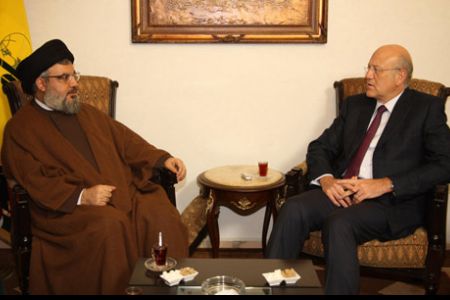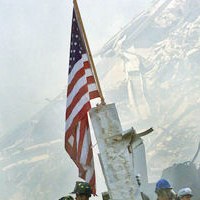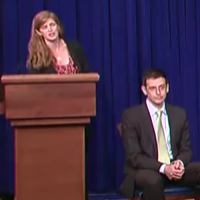![]()
Sun, Sept 11, 2011 | WikiLeaks
WikiLeaks: Lebanese PM Mikati described Hezbollah as ‘tumor’
Lebanese Prime Minister Najib Mikati described Shi’a Muslim terrorist group Hezbollah as a “tumor” during a meeting on December 18, 2008 with U.S. State Department official David Hale and former US Ambassador to Lebanon Michele Sison, according to an U.S. embassy cable released by Wikileaks. Mikati, speaking as a “statesman,” added that Hezbollah’s mini-state must be removed in order to preserve Lebanon.
Regardless of his personal views on the group, Mikati said he was expecting Hezbollah to bring Lebanon to a “sad ending.”
According to the released cable, Mikati said that Hezbollah’s ultimate goal in Lebanon was to create an Iranian military base on the Mediterranean from which Ayatollah Khomeini’s Islamic revolution could be carried to the west. This goal will take time but Hezbollah is patient, Mikati said.
U.S. official David Hale told Mikati that peace with Israel was the most direct way to counter such intentions. Mikati agreed that peace with Israel would be a “happy ending,” but questioned whether Syria would make an agreement without Iranian permission. He called diplomatic relations with Syria “cosmetic,” but important.
Read the cable below.
Source: WikiLeaks
Reference ID: 08BEIRUT1773
Created: 2008-12-19 15:08
Classification: CONFIDENTIAL
Origin: Embassy BeirutVZCZCXRO0932
PP RUEHAG RUEHBC RUEHDE RUEHKUK RUEHROV RUEHSR
DE RUEHLB #1773/01 3541508
ZNY CCCCC ZZH
P 191508Z DEC 08
FM AMEMBASSY BEIRUT
TO RUEHC/SECSTATE WASHDC PRIORITY 3810
INFO RUEHEE/ARAB LEAGUE COLLECTIVE
RUCNMEM/EU MEMBER STATES COLLECTIVE
RUCNDT/USMISSION USUN NEW YORK 3281
RUEHNO/USMISSION USNATO 3491
RHMFISS/CDR USCENTCOM MACDILL AFB FL
RHEHAAA/NSC WASHDC
RUEKJCS/SECDEF WASHDCC O N F I D E N T I A L SECTION 01 OF 03 BEIRUT 001773
SIPDIS
DEPT FOR NEA/FO, NEA/ELA
ALSO FOR IO A/S HOOK, PDAS WARLICK
P FOR DRUSSELL AND RRANGASWAMY
USUN FOR KHALILZAD/WOLFF/GERMAIN/SCHEDLBAUER
NSC FOR AMBRAMS/RAMCHAND/YERGER/MCDERMOTTE.O. 12958: DECL: 12/01/2018
TAGS: PREL PGOV PTER PINR UNSC MARR MOPS LE SY
SUBJECT: LEBANON: WITH DAS HALE, MIKATI CALLS HIZBALLAH A
“TUMOR” NEEDING REMOVALClassified By: Ambassador Michele J. Sison for reasons 1.4
(b) and (d).SUMMARY
——-¶1. (C) Former Prime Minister Najib Mikati told visiting NEA
DAS Hale and the Ambassador that Sunni leader Saad Hariri,
with whom Mikati acknowledged seeking an electoral alliance,
would win the Tripoli district in Lebanon’s 2009
parliamentary elections. Mikati said he would refuse the
position of prime minister absent backing of the Sunni
population and acknowledged that Hariri would likely be
Lebanon’s next prime minister. On President Sleiman, Mikati
expressed concern that the LAF and the Maronite Patriarch —
traditional stalwarts of support for the president — were
not 100 percent behind Sleiman. DAS Hale emphasized the need
to support Sleiman — who has proven himself
independent-minded and supportive of UNSCR 1701 and the
Special Tribunal for Lebanon — despite imperfect conditions.¶2. (C) Describing Hizballah several times during the December
18 meeting as a “tumor,” Mikati said the group’s mini-state
must be removed in order to preserve Lebanon. He noted that
diplomatic relations with Syria were purely “cosmetic” but
argued better relations with Lebanon’s neighbor provided the
GOL space to counter Hizballah. Hale agreed that relations
between the two sovereign neighbors was important, but must
be based on mutual respect and non-interference. Mikati
opined that Hizballah’s ultimate goal in Lebanon was to
create an Iranian military base on the Mediterranean from
which Ayatollah Khomeini’s Islamic revolution could be
carried to the west. Mikati called Russia’s
recently-announced gift of MIG-29 fighter planes “strange.”
End summary.“BLOOD OF HARIRI” STILL
IN TRIPOLI
———————–¶3. (C) In a December 18 meeting with visiting NEA DAS David
Hale and the Ambassador, accompanied by NEA/ELA Desk Officer
Matthew Irwin and Econoff, former Prime Minister Najib Mikati
said he expected the 2009 parliamentary elections to be tough
only in certain areas, specifically the Metn, west Bekaa, and
Zahle. Akkar and Mina would go entirely to Hariri, Mikati
assessed. He acknowledged that “because I exist,” there will
be a fight in Tripoli. However, Mikati — who described
himself as not a “man of fighting” — said “the blood of
(assassinated former Prime Minister Rafiq) Hariri still
exists” in Tripoli and Saad Hariri would take the electoral
district. DAS Hale noted that Lebanon’s independence was a
priority for the U.S.¶4. (C) Mikati expected 70 percent of the Tripoli population
would back Hariri; the other 30 percent Mikati described as
those whose votes are for sale. While admitting he had no
desire for a slot for himself on the Hariri list, Mikati said
he was trying to join forces with Hariri. Mikati said he
could not go against the popular sentiment in the north
favoring Hariri. On northern Lebanon’s other major Sunni
politicians, Mikati said he had heard Minister of Economy and
Trade Mohammed Safadi was trying to build bridges to former
Prime Minister Omar Karami.NO PM POST WITHOUT SUNNI BACKING
———————————¶5. (C) On post-election cabinet scenarios, Mikati assessed
that Prime Minister Fouad Siniora was “expired.” Describing
Siniora as a friend whom he respects, Mikati, nonetheless,
said Siniora should take a break from the position. Mikati
tallied a checklist to determine Hariri’s potential as prime
minister. He assessed Hariri wanted the slot but wondered
whether Saudi Arabia wanted Hariri in the post. Mikati
offered a hesitant yes to his own rhetorical question on
Hariri’s capabilities for the position. The job was
challenging; the person chosen would need to build the stateBEIRUT 00001773 002 OF 003
again, Mikati said. According to Mikati, Hariri is the most
likely candidate for prime minister after the 2009 elections.¶6. (C) Responding to a question about the prime minister post
in the event of a March 8 victory, Mikati said he would
refuse the position under the circumstances because he would
not be representing the Sunni population. Citing the
unsuccessful governments of Salim Hoss and Omar Karami,
Mikati said becoming prime minister without the full support
of the Sunni community would always result in failure.
Mikati said he was “not ready to fail.” He mentioned former
Prime Minister Abdul-Rahim Mrad as a potential PM in a March
8-dominated government. DAS Hale acknowledged the need for
Sunni backing of any prime minister — who is the highest
Sunni representative in government — and stressed the
importance of avoiding candidates such as Mrad in the post.HESITATION ON SLEIMAN
———————¶7. (C) Describing President Michel Sleiman as quiet and
unchallenging, Mikati said he had not yet seen in Lebanon the
results of Sleiman’s efforts, domestically or from his many
trips abroad. However, Mikati assessed Sleiman was trying to
demonstrate his wisdom and judgment before serving as
arbitrator, the traditional role of Lebanon’s presidents.
According to Mikati, once Sleiman is arbitrator, he can
govern. Nonetheless, Mikati described as “worrisome” a
December 17 conversation with Sleiman in which the President
said his job was easier than what he had expected. Mikati
told DAS Hale and the Ambassador he had counseled Sleiman to
create strong state institutions to counter Hizballah’s
mini-state.¶8. (C) The Lebanese Armed Forces (LAF) and the Maronite
Patriarch, traditional strongholds of presidential support,
are not stalwartly pro-Sleiman, according to Mikati. He
described the LAF as polarized toward March 8 with most
officers supporting Hizballah and opposition Christian leader
Michel Aoun. Mikati described Sleiman as unsure he had the
LAF’s full support. Fear of fracturing the army had probably
also prevented then LAF Commander Sleiman from taking any
drastic decision between 2005 and 2008, Mikati said.¶9. (C) On the traditional buttress of support for the
president from the Patriarch, Mikati ceded that Sfeir was
“not in love with Sleiman.” DAS Hale opined, however, that
despite these concerns President Sleiman seemed to recognize
he had more room for maneuvering than his predecessor.
Sleiman had demonstrated support for Lebanon’s independence,
adherence to UNSCR 1701, and progress on the Hariri tribunal,
DAS Hale said. Despite his operating in an imperfect
situation, President Sleiman still deserved support.HIZBALLAH:
A “TUMOR” IN THE STATE
———————–¶10. (C) Mikati, speaking as a “statesman,” argued Lebanon
could not survive with a Hizballah mini-state. Regardless of
his personal views on the group, Mikati said he was expecting
Hizballah to bring Lebanon to a “sad ending.” He assessed
that Hizballah was just like a tumor that, whether benign or
malignant, must be removed. While acknowledging weakening
the group would take time, DAS Hale agreed that a non-state
entity with the power of creating war and peace in Lebanon
was tremendously dangerous. He supported enacting multiple
policies and employing multiple tools to confront the group
and to make Hizballah’s backers see more liabilities in their
support than assets. Continuation of the National Dialogue
would also help counter Hizballah.¶11. (C) On Hizballah’s goals in Lebanon, Mikati assessed Iran
was using the group to create a military base on the
Mediterranean. Ayatollah Khomeini’s goal to export the
Islamic revolution to the west required a launching point,
which, according to Mikati, is Lebanon. This goal will take
time but Hizballah is patient, he said. DAS Hale told Mikati
that peace with Israel was the most direct way to counterBEIRUT 00001773 003 OF 003
such intentions. Mikati agreed that peace with Israel would
be a “happy ending,” but questioned whether Syria would make
an agreement without Iranian permission.¶12. (C) Mikati expressed doubt that upcoming parliamentary
elections, regardless of a March 14 or opposition victory,
would change Lebanon’s tumorous “reality.” DAS Hale
stressed, however, that a Hizballah-dominated government
would significantly change the country’s internal situation
and potentially the U.S. stance toward the GOL. DAS Hale
emphasized preservation of a pro-independence cabinet, even
if not all the ministers are March 14.“NEUTRALIZE” SYRIA THROUGH
DIPLOMATIC RELATIONS
—————————¶13. (C) Mikati called diplomatic relations with Syria
“cosmetic,” but important. He emphasized the need to keep
Lebanon’s interests a priority, but assessed that
“neutralizing” the Syrian track made completing work simpler
in Lebanon. While acknowledging the need for good
state-to-state relations between the neighbors, DAS Hale said
Syria’s faction-based support of Lebanese politicians was
unacceptable. Noting the visits of Lebanon’s Minister of
Foreign Affairs, Minister of Interior, and LAF Commander, and
the upcoming visit of Minister of Defense Elias Murr, Mikati
assessed the Syrians had chosen the particular “island” of
coordination they sought in Lebanon. Mikati argued that
neutralizing Syria would enable the GOL to “gain time” on
Hizballah.CONCERNED ABOUT GOL DEBT
————————-¶14. (C) Responding to DAS Hale’s inquiry about the state of
the Lebanese economy, Mikati said that, looking at loans from
commercial banks, the Lebanese economy was doing well.
However, Mikati expressed concern about government debt
–projected to reach $9.5 billion next year — held in
commercial banks. He argued some of the short-term
government loans should be negotiated to long-term loans.
Additionally, a shortage of transfers from abroad could cause
liquidity problems in Lebanon. The transfer of dollars into
Lebanese pounds — which yield much higher interest rates —
would also reduce bank liquidity. However, Mikati expressed
confidence in Central Bank Governor Riad Salameh and his
handling of the issues.A “STRANGE” GIFT FROM THE RUSSIANS
———————————–¶15. (C) Talking with the Ambassador before DAS Hale’s
arrival, Mikati described the Russian gift of MIG-29 fighter
planes — which received extensive local media coverage in
recent days — as “strange.” He questioned whether Defense
Minister Murr asked specifically for the planes or if the
Russians had chosen independently to offer them. Mikati said
the planes would be “impossible” to maintain and small
helicopters would have been more useful for the LAF.¶16. (C) Comment: Mikati clearly was presenting himself for
our benefit as a foe of Hizballah, as he is looking forward
to potential opportunities to return to the Prime Ministry.
End comment.¶17. (U) DAS Hale has cleared this cable.
SISON



 RSS
RSS










WikiLeaks: Lebanese PM Mikati described Hezbollah as ‘tumor’ | Middle East News, Articles, Backgroun http://t.co/UUHYhhj
WikiLeaks: Lebanese PM Mikati described Hezbollah as ‘tumor’ | Middle East News, Articles, Backgroun http://t.co/UUHYhhj